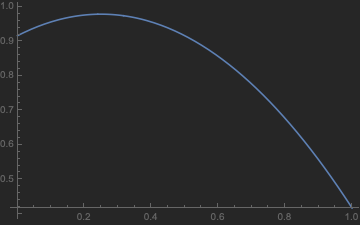I'm getting non-numerical-evaluation error messages despite not having any symbolic variables in my code.
Here's a MWE representative of what I'm doing:
f[x_,y_]:=NIntegrate[(2y-(x-a/2)^2),{a,0,1}];
FindMaximum[{f[x,0.5],0<x<1},{x,0}]
This results in the following error:
NIntegrate: The integrand 1.-((-(a/2)+x)^2) has evaluated to non-numerical values for all sampling points in the region with boundaries {{0,1}}.
I don't see what the problem is. $f$ is clearly a function of $x$ and $y$ and has no non-numerical parameters. I fact, it seems to behave properly other than when I ask it to find the maximum:
f[0.2,0.5]
0.9767
Plot[f[x,0.5],{x,0,1}]
I've tried adding ?NumericQ in the function definition as follows, but I get the same result:
f[x_,y_?NumericQ]:=NIntegrate[(2y-(x-a/2)^2),{a,0,1}];
I've also tried adding ?NumericQ to to function arguments when I call the function in the FindMaximum command, again to no avail:
FindMaximum[{f[x,0.5?NumericQ],0<x<1},{x,0}]
I had a look at this Q&A, but my situation doesn't fall into any of the cases described there.
What's going on?


Clear[f]; f[x_?NumericQ, y_?NumericQ] := NIntegrate[(2 y - (x - a/2)^2), {a, 0, 1}];$\endgroup$?NumericQwas a per-variable command; I figured adding it once would make it work for all variables of a function. Cheers! (If you can type that as an answer, I can accept that answer.) $\endgroup$